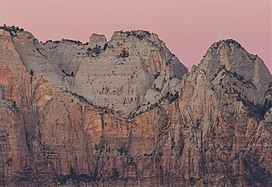The Sundial (Zion National Park)
| The Sundial | |
|---|---|
 The Sundial, east aspect at dawn (The Witch Head to right) | |
| Highest point | |
| Elevation | 7,590 ft (2,310 m)[1] |
| Prominence | 530 ft (160 m)[1] |
| Parent peak | The West Temple (7,810 ft)[1] |
| Isolation | 0.38 mi (0.61 km)[1] |
| Coordinates | 37°12′56″N 113°01′27″W / 37.2155109°N 113.0242192°W[2] |
| Geography | |
| Country | United States |
| State | Utah |
| County | Washington |
| Protected area | Zion National Park |
| Parent range | Colorado Plateau |
| Topo map | USGS Springdale West |
| Geology | |
| Rock age | Jurassic |
| Climbing | |
| Easiest route | class 5+ climbing[1] |
The Sundial is a 7,590-foot (2,310-meter) elevation white Navajo Sandstone summit located in Zion National Park, in Washington County of southwest Utah, United States.[2]
Description
[edit]The Sundial is situated in the "Towers of the Virgin", 2.5 mi (4.0 km) west of Zion's park headquarters, towering 3,600 feet (1,100 meters) above the floor of Zion Canyon and the Virgin River which drains precipitation runoff from this mountain. Its nearest higher neighbor is The West Temple, one half mile to the southeast, and Altar of Sacrifice is set approximately one mile to the north-northeast. Other neighbors include The Witch Head, Bee Hive, The Sentinel, Mount Spry, Bridge Mountain, and Mount Kinesava. This geographical feature was named by the park's third superintendent, Preston P. Patraw, because it had long been used as a sundial to regulate clocks in the nearby town of Grafton. The Sundial's name was officially adopted in 1934 by the U.S. Board on Geographic Names.[2]
Climate
[edit]Spring and fall are the most favorable seasons to visit The Sundial. According to the Köppen climate classification system, it is located in a Cold semi-arid climate zone, which is defined by the coldest month having an average mean temperature below 32 °F (0 °C), and at least 50% of the total annual precipitation being received during the spring and summer. This desert climate receives less than 10 inches (250 millimeters) of annual rainfall, and snowfall is generally light during the winter.[3]
Gallery
[edit]See also
[edit]References
[edit]- ^ a b c d e "Sundial, The - 7,590' UT". listsofjohn.com. Retrieved September 10, 2020.
- ^ a b c U.S. Geological Survey Geographic Names Information System: The Sundial
- ^ "Zion National Park, Utah, USA - Monthly weather forecast and Climate data". Weather Atlas. Archived from the original on January 27, 2019. Retrieved August 31, 2020.
External links
[edit]- Zion National Park National Park Service
- Weather forecast
- Web cam


 French
French Deutsch
Deutsch











